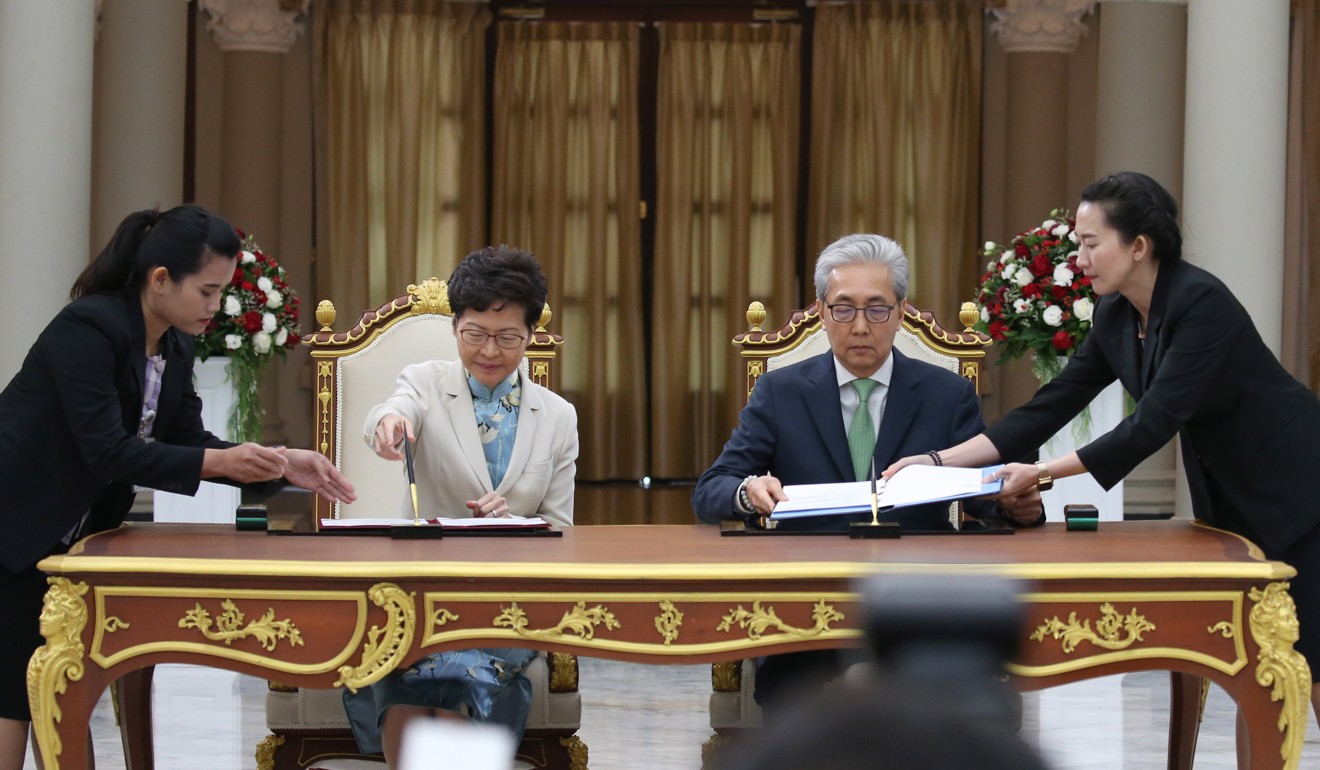
Hong Kong, Thailand agree to pursue free trade deal, Carrie Lam tells Bangkok that protests have not dented city’s underlying economic strength
- City leader insists Hong Kong will ‘bounce back, as we always do’ during visit to Bangkok
- Two jurisdictions agree to open up their economies to each other, forge closer trading ties
Hong Kong and Thailand agreed on Friday to boost bilateral economic ties, paving the way for free trade talks, as anti-government protests continued to batter the city.
Chief Executive Carrie Lam Cheng Yuet-ngor revealed in Bangkok that she and Thailand’s deputy prime minister Somkid Jatusripitak had signed a memorandum of understanding that included an ambition to pursue a free trade deal.
The leader sought to reassure Thailand of Hong Kong’s strong foundations, with the city in the grip of ongoing protests and escalating violence for almost six months.

“Hong Kong is undergoing a difficult period,” she said on Friday.
“Despite the social unrest, I wish to assure our Thai friends that Hong Kong’s fundamentals – including our unique strengths under ‘one country, two systems’, our rule of law and independent judiciary – remain strong.
“I and my government are listening to our people with a view to resolving some deep-seated problems in Hong Kong through dialogue.
“I have every confidence Hong Kong can bounce back, as we always do.”
Since June, protests have thrown the city into chaos, with peaceful gatherings often descending into violent clashes between hardcore demonstrators and police, while repeated attempts are made to paralyse the city’s transport system.
Violence has spread across tourist, commercial and residential districts. Shops, restaurants and banks with mainland China links have been severely vandalised, while street fights break out between those holding different political views.
Meanwhile, university campuses emerged as a fresh battleground between police and radicals in November.

Amid the double whammy of the protests and the ongoing US-China trade war, Hong Kong slipped into recession in the third quarter of this year, when gross domestic product contracted 3.2 per cent from the preceding quarter.
It is the second consecutive period of negative economic growth, following the second quarter’s 0.4 per cent drop on the first quarter of this year.
October sees biggest drop in tourist arrivals since start of Hong Kong protests
In her fourth visit to Bangkok since taking office in 2017, Lam said the two economies would explore collaboration over bilateral trade and investments, the mutual recognition of securities trading and green finance via respective stock exchanges, creative industries, manufacturing, technology development, human resources development and academic exchanges.
Secretary for Commerce and Economic Development Edward Yau Tang-wah, who led a 50-member business delegation to the country and attended the signing ceremony, said Hong Kong’s relationship with Bangkok would be built on solid foundations as part of a long-term vision.
“The sole purpose [of closer collaboration between the two economies] is to create a better environment for the smaller and medium-sized enterprises and professional services where the respective strengths will be fully demonstrated,” he said.
Hong Kong in recession as economy shrinks 3.2 per cent in third quarter
Thailand is one of Hong Kong’s top three trading partners in the Association of Southeast Asian Nations or Asean, the 10-country economic bloc.
“Asean is important to Hong Kong,” Yau said. “Even if Hong Kong has a free trade agreement with Asean, it does not mean we cannot have a separate one with Thailand.”
He added Thailand had interests in areas where Hong Kong excels, such as professional services.
After sealing the Asean free trade agreement in 2017, five Asean countries of Singapore, Thailand, Vietnam, Laos and Myanmar saw their free trade deals with Hong Kong take effect in June. Bilateral investment agreements with the five nations also came into force that month.
Hong Kong exports shrink 9.2 per cent in October
The effective dates of the rest of the bloc's members – Brunei, Cambodia, Indonesia, the Philippines and Malaysia – will be announced at a later date.
“In the past it may be confined to the trading of agricultural products but now we are talking about premium products in agricultural area,” Yau said.
“We also see huge opportunities opened up in other areas, for instance on co-investment in projects in this region.”
The Federation of Hong Kong Industries, one of the city’s biggest business organisations, welcomed the decision to forge closer bilateral ties.
It anticipated more opportunities for the city’s innovation and technology sector to tap into Thailand’s development in digital production.
Free trade agreements aim to eliminate barriers between economies and include lifting tariffs on goods and services. Hong Kong has signed eight such agreements with mainland China, New Zealand, Chile, Australia and others.

